
 |
|
Charlie and the Chocolate Factory (2005) Cast: Johnny Depp, Freddie Highmore, David Kelly, Annasophia Robb, Julia Winter, Jordan Fry, Helena Bonham Carter, Noah Taylor, Missi Pyle, James Fox, Adam Godley, Philip Wiegratz, Franziska Troegner, Deep Roy, Christopher Lee, Liz Smith, Eileen Essell, David Morris, Phil Philmore, Nitin Ganatra, Shelley Conn; narrated by Geoffrey Holder 2005 – 115 minutes Rated: Reviewed by Dustin Putman, July 9, 2005. 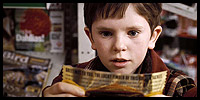 There is just about no other major modern filmmaker more well-suited for adapting Roald Dahl's half-grim/half-sweet, part-morality tale/part-cautionary fable "Charlie and the Chocolate Factory" than Tim Burton. Burton, whose sparkling credits include 1988's "Beetlejuice," 1989's "Batman," 1990's "Edward Scissorhands," and 1999's "Sleepy Hollow," does weird, oddball, and off-kilter with more joyous aplomb than anyone, and his ongoing collaborations with ingenious music composer Danny Elfman have never disappointed in evoking a specific mood and haunting allure to the pictures' sound, tone and visuals. Within the mere instant the Warner Bros. logo appears on screen to the first strings of Elfman's thrilling, fittingly peculiar score, there is no question we are safe and sound back in common Tim Burton territory, made all the more indelible with a stupendous opening credits sequence that takes the viewer on a trip through Wonka's process of creating, wrapping, boxing, and sending out his chocolate bars.
There is just about no other major modern filmmaker more well-suited for adapting Roald Dahl's half-grim/half-sweet, part-morality tale/part-cautionary fable "Charlie and the Chocolate Factory" than Tim Burton. Burton, whose sparkling credits include 1988's "Beetlejuice," 1989's "Batman," 1990's "Edward Scissorhands," and 1999's "Sleepy Hollow," does weird, oddball, and off-kilter with more joyous aplomb than anyone, and his ongoing collaborations with ingenious music composer Danny Elfman have never disappointed in evoking a specific mood and haunting allure to the pictures' sound, tone and visuals. Within the mere instant the Warner Bros. logo appears on screen to the first strings of Elfman's thrilling, fittingly peculiar score, there is no question we are safe and sound back in common Tim Burton territory, made all the more indelible with a stupendous opening credits sequence that takes the viewer on a trip through Wonka's process of creating, wrapping, boxing, and sending out his chocolate bars.
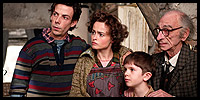 From there the picture begins proper, and while screenwriter John August (2003's "Big Fish") was instructed to solely adapt Dahl's novel rather than the previous cinematic rendering, they are similar enough in story and events that it is difficult not to compare 2005's "Charlie and the Chocolate Factory" with 1971's "Willy Wonka and the Chocolate Factory." The latter has grown to become such an iconic treasure that even now, almost thirty-five years later, children (and adults who were children years ago) are still head-over-heels in love with it. For myself, that immortal Gene Wilder classic was and remains one of the most affectionately felt films from my childhood, a positively horrific family feature complete with a chicken getting its head chopped off, kids in grave danger, a spooky gated factory presumed abandoned, a sinister man named Wonka, and, lo and behold, a worthwhile message and an underlying sweetness to match the chocolatey confections on display throughout.
From there the picture begins proper, and while screenwriter John August (2003's "Big Fish") was instructed to solely adapt Dahl's novel rather than the previous cinematic rendering, they are similar enough in story and events that it is difficult not to compare 2005's "Charlie and the Chocolate Factory" with 1971's "Willy Wonka and the Chocolate Factory." The latter has grown to become such an iconic treasure that even now, almost thirty-five years later, children (and adults who were children years ago) are still head-over-heels in love with it. For myself, that immortal Gene Wilder classic was and remains one of the most affectionately felt films from my childhood, a positively horrific family feature complete with a chicken getting its head chopped off, kids in grave danger, a spooky gated factory presumed abandoned, a sinister man named Wonka, and, lo and behold, a worthwhile message and an underlying sweetness to match the chocolatey confections on display throughout.
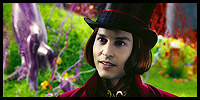 In its own way, Burton's reimagining, "Charlie and the Chocolate Factory," is just as occasionally creepy and menacing, and ultimately even more of an emotional sugar rush by the feel-good last scenes. It follows the book to a more faithful degree, even touching upon flashback sequences to the jungle where Willy Wonka (Johnny Depp) discovered the community of Oompa Loompas and to India where Wonka was asked by Prince and Princess Pindicherry (Nitin Ganatra, Shelley Conn) to build a palace made completely out of chocolate. The demise of spoiled brat Veruca Salt (Julia Winter) has been changed back from golden geese (in the 1971 movie) to a run-in with vicious nut-cracking squirrels. Gone are the original songs, replaced by the lyrics of the song-and-dance routines with the Oompa Loompas copied almost verbatim from Dahl's own words. A totally original creation, meanwhile, are the sad and disturbing glimpses back to Willy's childhood, depicting his rocky relationship with an anti-candy dentist father named Wilbur Wonka (Christopher Lee) and his own decision to make the great-tasting sweets his life's work. These keys to Willy's identity are the most welcome fresh additions, beautifully written and visually diverse as they work to clarify who the mysterious inventor was, where he comes from, and who he ultimately became.
In its own way, Burton's reimagining, "Charlie and the Chocolate Factory," is just as occasionally creepy and menacing, and ultimately even more of an emotional sugar rush by the feel-good last scenes. It follows the book to a more faithful degree, even touching upon flashback sequences to the jungle where Willy Wonka (Johnny Depp) discovered the community of Oompa Loompas and to India where Wonka was asked by Prince and Princess Pindicherry (Nitin Ganatra, Shelley Conn) to build a palace made completely out of chocolate. The demise of spoiled brat Veruca Salt (Julia Winter) has been changed back from golden geese (in the 1971 movie) to a run-in with vicious nut-cracking squirrels. Gone are the original songs, replaced by the lyrics of the song-and-dance routines with the Oompa Loompas copied almost verbatim from Dahl's own words. A totally original creation, meanwhile, are the sad and disturbing glimpses back to Willy's childhood, depicting his rocky relationship with an anti-candy dentist father named Wilbur Wonka (Christopher Lee) and his own decision to make the great-tasting sweets his life's work. These keys to Willy's identity are the most welcome fresh additions, beautifully written and visually diverse as they work to clarify who the mysterious inventor was, where he comes from, and who he ultimately became.
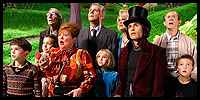 The premise itself remains the same. Top-secret candy maker Willy Wonka, whose factory doors have been shut for years, suddenly opens up the world's imagination (and thirst for chocolate) when he makes an announcement: five golden tickets have been placed under the wrappers of Wonka bars across the globe, and the five children who find them will be allowed a tour of his factory. There will also be a grand prize winner, who will win something beyond their wildest imagination. When, by chance, poor, virtuous Charlie Bucket (Freddie Highmore) finds the last remaining golden ticket with money he finds laying on the street, his dreams have already begun to come true before he has even met the host of the tour. Once behind the doors of the factory, the tour gets underway. By the time the day is out, only one child will remain, the other four—foodaholic Augustus Gloop (Philip Wiegratz), gum-chewing enthusiast Violet Beauregarde (Annasophia Robb), greedy Veruca Salta, and television/video game-obsessed Mike Teavee (Jordon Fry)—being done in by their own vanity, materialism, gluttony, and competitiveness.
The premise itself remains the same. Top-secret candy maker Willy Wonka, whose factory doors have been shut for years, suddenly opens up the world's imagination (and thirst for chocolate) when he makes an announcement: five golden tickets have been placed under the wrappers of Wonka bars across the globe, and the five children who find them will be allowed a tour of his factory. There will also be a grand prize winner, who will win something beyond their wildest imagination. When, by chance, poor, virtuous Charlie Bucket (Freddie Highmore) finds the last remaining golden ticket with money he finds laying on the street, his dreams have already begun to come true before he has even met the host of the tour. Once behind the doors of the factory, the tour gets underway. By the time the day is out, only one child will remain, the other four—foodaholic Augustus Gloop (Philip Wiegratz), gum-chewing enthusiast Violet Beauregarde (Annasophia Robb), greedy Veruca Salta, and television/video game-obsessed Mike Teavee (Jordon Fry)—being done in by their own vanity, materialism, gluttony, and competitiveness.
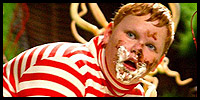 "Charlie and the Chocolate Factory" is a marvel of economic visual storytelling (one could mute the sound and understand just as well what is going on) and a super-fast, enjoyable two-hour experience. Disregarding its closer adherence to the source material, however, the film doesn't even begin to hold a candle next to 1971's version, which had more naturalistic performances, more thought-provoking moral conflicts for protagonist Charlie to face, stronger and more memorable characterizations of the fellow contestants and their parents, and, overall, a more satisfying tour of the titled whimsical factory. The tour at the center of Burton's opus—the high spot of the earlier version directed by Mel Stuart—is in some ways the weakest section, always in a rush to get to the next scene, giving Charlie and accompanying adult Grandpa Joe (David Kelly) next to nothing to do and no palpable bond to form, and developing the geography of the factory interiors in a vague, lackluster fashion.
"Charlie and the Chocolate Factory" is a marvel of economic visual storytelling (one could mute the sound and understand just as well what is going on) and a super-fast, enjoyable two-hour experience. Disregarding its closer adherence to the source material, however, the film doesn't even begin to hold a candle next to 1971's version, which had more naturalistic performances, more thought-provoking moral conflicts for protagonist Charlie to face, stronger and more memorable characterizations of the fellow contestants and their parents, and, overall, a more satisfying tour of the titled whimsical factory. The tour at the center of Burton's opus—the high spot of the earlier version directed by Mel Stuart—is in some ways the weakest section, always in a rush to get to the next scene, giving Charlie and accompanying adult Grandpa Joe (David Kelly) next to nothing to do and no palpable bond to form, and developing the geography of the factory interiors in a vague, lackluster fashion.
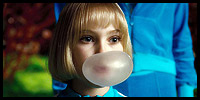 Better are the pint-sized Oompa Loompas (all delectably played by recent Burton regular Deep Roy), who perform a quirky range of musical numbers in different styles—one is a Bollywood production, one is a Beatlesesque ballad, one is a rock-and-roll journey through the land of television programming, and one was inspired by the vaudevillian musicals of the '30s and '40s. The lyrics themselves are sometimes difficult to discern, but that doesn't take much away from the sheer fun and audaciousness that they incorporate into the proceedings.
Better are the pint-sized Oompa Loompas (all delectably played by recent Burton regular Deep Roy), who perform a quirky range of musical numbers in different styles—one is a Bollywood production, one is a Beatlesesque ballad, one is a rock-and-roll journey through the land of television programming, and one was inspired by the vaudevillian musicals of the '30s and '40s. The lyrics themselves are sometimes difficult to discern, but that doesn't take much away from the sheer fun and audaciousness that they incorporate into the proceedings.
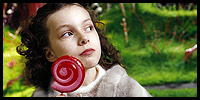 As the formidable Willy Wonka, whose role, coincidentally, is increased dramatically from the '71 effort despite a deletion of his name in the title, Johnny Depp (2004's "Finding Neverland") is brilliantly wide-eyed and self-deprecating, achieving the impossible by taking a deeply ingrained character synonymous with Gene Wilder in a new and fresh direction. Wonka is actually kinder and gentler here, a naive man still wounded from the hurt in his childhood. What he lacks is Wilder's soulful humanity and warm heart that shed through in that picture's final scenes. Depp is simply delicious in a role both broadly comic and lightly touching, but the character's every action is so plainly written that he doesn't come off as genuine.
As the formidable Willy Wonka, whose role, coincidentally, is increased dramatically from the '71 effort despite a deletion of his name in the title, Johnny Depp (2004's "Finding Neverland") is brilliantly wide-eyed and self-deprecating, achieving the impossible by taking a deeply ingrained character synonymous with Gene Wilder in a new and fresh direction. Wonka is actually kinder and gentler here, a naive man still wounded from the hurt in his childhood. What he lacks is Wilder's soulful humanity and warm heart that shed through in that picture's final scenes. Depp is simply delicious in a role both broadly comic and lightly touching, but the character's every action is so plainly written that he doesn't come off as genuine.
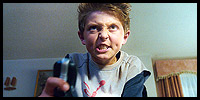 The same could be said for all of the actors playing the contestants' parents, who are dealing strictly in one-dimensional caricatures, and at least two of the child performers. Newcomer Julia Winter may be a physical dead-ringer for Julie Dawn Cole's Veruca Salt, but isn't nearly as convincing or delightfully nasty, while fellow first-timer Jordon Fry is forgettable as Mike Teavee. There are sturdier turns from Annasophia Robb (2005's "Because of Winn-Dixie"), as determined winner Violet Beauregarde, and novice Philip Wiegratz, as rotund hog Augustus Gloop, but again, the characters haven't been written with a sharp enough eye to raise them above single dimension.
The same could be said for all of the actors playing the contestants' parents, who are dealing strictly in one-dimensional caricatures, and at least two of the child performers. Newcomer Julia Winter may be a physical dead-ringer for Julie Dawn Cole's Veruca Salt, but isn't nearly as convincing or delightfully nasty, while fellow first-timer Jordon Fry is forgettable as Mike Teavee. There are sturdier turns from Annasophia Robb (2005's "Because of Winn-Dixie"), as determined winner Violet Beauregarde, and novice Philip Wiegratz, as rotund hog Augustus Gloop, but again, the characters haven't been written with a sharp enough eye to raise them above single dimension.
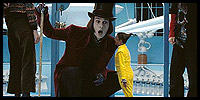 As hero Charlie Bucket, Freddie Highmore (last pairing with Depp in "Finding Neverland") is so mild-mannered and lovable that the only negative thing to say about him is that he doesn't show much range outside of two facial expressions: excited awe and disappointed sadness. As Grandpa Joe, such a powerful presence alongside Charlie in the earlier picture, David Kelly (2004's "Laws of Attraction") is so inconsequential as to might as well not even be there. Rounding out the cast are Helena Bonham Carter (2001's "Planet of the Apes") and Noah Taylor (2004's "The Life Aquatic with Steve Zissou") as Charlie's hard-up parents, and Eileen Essel (2003's "Duplex") and Liz Smith as kindly grandmas Josephine and Georgina. Smith gets one of the funniest early lines—"I like grapes!"—and can do no wrong after that.
As hero Charlie Bucket, Freddie Highmore (last pairing with Depp in "Finding Neverland") is so mild-mannered and lovable that the only negative thing to say about him is that he doesn't show much range outside of two facial expressions: excited awe and disappointed sadness. As Grandpa Joe, such a powerful presence alongside Charlie in the earlier picture, David Kelly (2004's "Laws of Attraction") is so inconsequential as to might as well not even be there. Rounding out the cast are Helena Bonham Carter (2001's "Planet of the Apes") and Noah Taylor (2004's "The Life Aquatic with Steve Zissou") as Charlie's hard-up parents, and Eileen Essel (2003's "Duplex") and Liz Smith as kindly grandmas Josephine and Georgina. Smith gets one of the funniest early lines—"I like grapes!"—and can do no wrong after that.
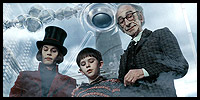 "Charlie and the Chocolate Factory" is good enough to stand on its own, but not quite good enough to not be a little wobbly on its feet. Burton is in full force, and blesses the production design and mood with portent atmosphere and colorful aesthetics. Furthermore, the film is sure to enchant audiences of kids and grown-ups even as fans of the original will recognize this version may be different and updated, but is notably inferior. What "Charlie and the Chocolate Factory" needs more of is heart, for as lovely as it is to look at and orally experience, it is close to being as emotionally mechanical. The sentiment is there, and there are a few effective isolated moments of such, but it all feels like an empty put-on rather than the genuine article, a clone rather than a real human in celluloid form. Burton has made it clear he does not want to be compared to "Willy Wonka and the Chocolate Factory," but there's no way of getting around the notion that it was better on nearly all fronts the first time around.
"Charlie and the Chocolate Factory" is good enough to stand on its own, but not quite good enough to not be a little wobbly on its feet. Burton is in full force, and blesses the production design and mood with portent atmosphere and colorful aesthetics. Furthermore, the film is sure to enchant audiences of kids and grown-ups even as fans of the original will recognize this version may be different and updated, but is notably inferior. What "Charlie and the Chocolate Factory" needs more of is heart, for as lovely as it is to look at and orally experience, it is close to being as emotionally mechanical. The sentiment is there, and there are a few effective isolated moments of such, but it all feels like an empty put-on rather than the genuine article, a clone rather than a real human in celluloid form. Burton has made it clear he does not want to be compared to "Willy Wonka and the Chocolate Factory," but there's no way of getting around the notion that it was better on nearly all fronts the first time around.
|
© 2008 by Dustin Putman |














